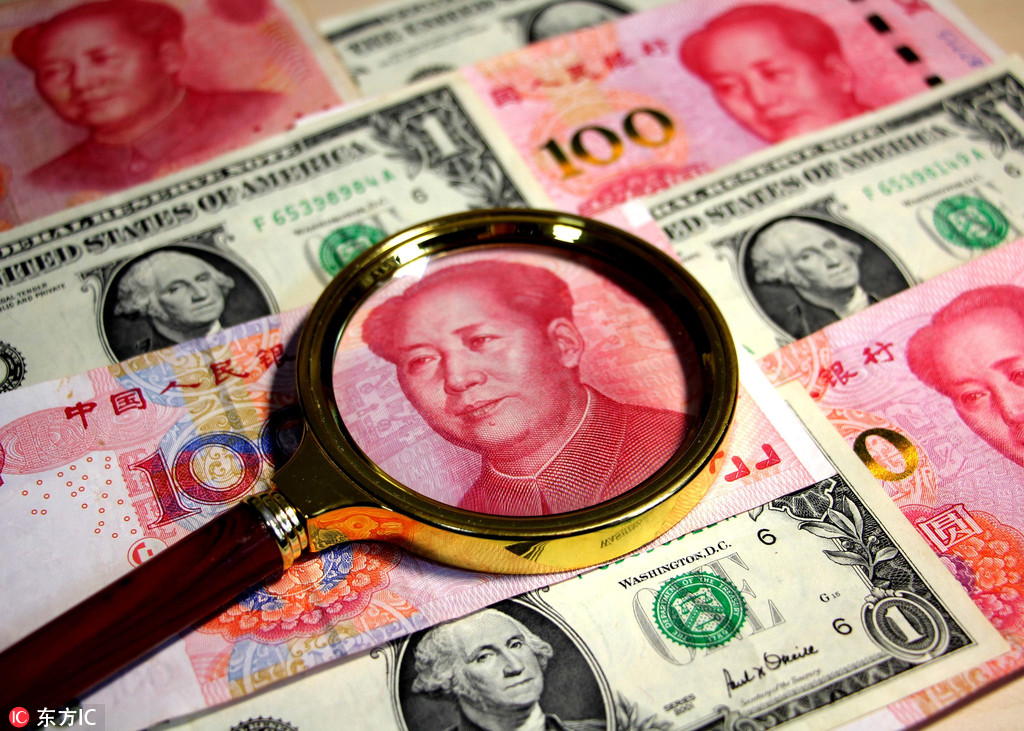SAFE takes a firm stance to counter risks


China's foreign exchange regulator is maintaining a firm stance on freeing cross-border capital investments amid the acceleration of financial opening-up, while remaining cautious about potential shocks from external financial instability.
The country's international payments under the current account recorded a $28.2 billion deficit in the first quarter, due to seasonal factors and faster growth of imports than exports, compared with a surplus of $62.3 billion a quarter earlier and a total surplus of $164.9 billion for the whole year of 2017, according to State Administration of Foreign Exchange data released on Friday.
It also showed net inflows of cross-border capital for the fourth consecutive quarter, along with a net inflow of foreign direct investment valued at $68.2 billion, an increase of 110 percent since a year earlier.
The country's foreign exchange reserves increased by $26.6 billion during the first three months and reached a total outstanding of $3.14 trillion by March, according to the administration.
"The full-year balance of current account is expected to remain within a reasonable range, with a still solid base for balanced international payments," said a SAFE spokesperson.
"We will push forward the two-way opening up of China's financial market, to gradually achieve a convertible capital account and further free cross-border trade and investment," said Pan Gongsheng, vice-governor of the People's Bank of China and head of SAFE.
"We will also prevent cross-border capital flow risks, to provide a sound business environment for both domestic and foreign enterprises," said Pan, during a meeting with executives from foreign companies including HSBC Holdings, Standard Chartered Bank and BMW Automotive Group, on Thursday.
One risk that needs to be taken into account in the near term is the Sino-US trade tension, warned Jameel Ahmad, global head of Currency Strategy and Market Research at forex broker ForexTime.
"There is a concern that a breakthrough in the trade tension will be unlikely and any suggestions that there will be a breakdown in talks between the two largest economies in the world presents a risk that the financial markets will react," said Ahmad, stressing that the potential negative impacts would include a reduction of purchasing momentum for emerging market currencies, which could push cross-border capital flows out of those countries.
Earlier last month, Chinese officials showed confidence that the impact of Sino-US trade frictions on the country's balance of international payments is controllable.
Global market fears rose during the past few weeks when the dollar rallied, along with the rising yields of US bonds, as emerging market bond markets showed fund withdrawals.
To contain possible vulnerability from cross-border capital flows, China's central bank has included supervision of overseas investment activities in the macro-prudential regulatory framework.
Investors under the RMB Qualified Domestic Institutional Investors program were recently banned from moving yuan out of the country for forex purchases overseas. Instead, they are allowed to invest in yuan-denominated assets in foreign capital markets, as the country takes a "gradual approach" to open up its financial sector.
"Domestic custodian banks shall strengthen checks on the authenticity and legality of investment plans to ensure such activities are conducted according to laws and regulations," according to a guideline issued by the PBOC on Thursday.
"As we promote opening up of the financial sector, we will take capital flow into consideration," which is stable so far, said Yi Gang, the central bank governor, last month when he attended the Boao Forum for Asia Annual Conference 2018.
At the forum, the governor also announced a slew of measures and a corresponding timetable to further open the financial sector, and most of the new policies, including removing the foreign ownership cap for banks and asset management companies, are planned to take effect by the end of this year.
"As China further opens up, Chinese households and institutions can allocate assets globally to a greater extent. Based on the demands of investors both at home and abroad, cross-border capital flow is expected to be stable and efficient," Yi said.



































